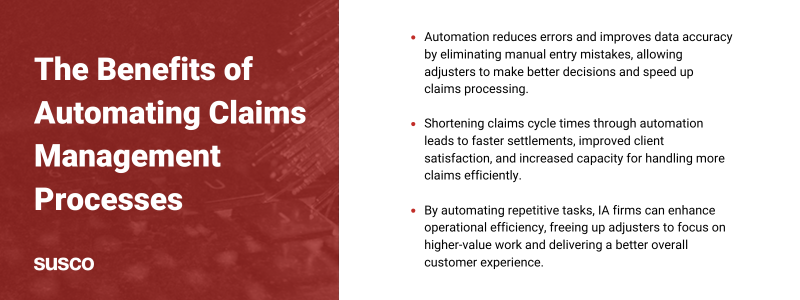
For Independent Adjusting (IA) firms, managing claims manually can be a cumbersome, error-prone process that slows down cycle times and impacts overall efficiency.
Relying on outdated workflows can create significant challenges in a competitive environment where accuracy and speed are key to client satisfaction. Automation presents a solution that streamlines operations, reduces costly mistakes, and accelerates claims handling.
Here’s what you need to know:
Reducing Errors and Shortening Cycle Times
For IA firms, manual processes can introduce inefficiencies and errors that delay claims and affect accuracy. Automating claims management processes addresses both these challenges by enhancing data accuracy and significantly reducing the time it takes to settle claims.
Manual data entry is prone to errors, such as:
- Typos and miscalculations
- Duplicate entries
- Inconsistent data across systems
Automation helps eliminate these common mistakes by:
- Standardizing data entry: Automated systems ensure that information is entered correctly.
- Minimizing duplication: Integrating with platforms like XactAnalysis and Symbility allows data to be shared across systems without requiring manual re-entry.
- Improving accuracy: With fewer human errors, adjusters can make better decisions, resulting in more accurate claims assessments and higher client satisfaction.
Manual workflows can extend claims processing times, leading to:
- Delays in assigning adjusters
- Slow approvals and documentation updates
- Frustrated clients and revenue slowdowns
Automation accelerates these processes by:
- Automated dispatching: Adjusters are assigned faster, allowing for quicker claim resolutions.
- Streamlined approvals: Automated workflows reduce the need for manual reviews and approvals, speeding up each step.
- Real-time reporting: Business intelligence tools help identify and resolve bottlenecks, improving efficiency and shortening the time to settlement.
Automation empowers adjusters to focus on delivering higher-quality claims faster, benefiting the firm and its clients.
Reducing Errors and Shortening Cycle Times
For Independent Adjusting (IA) firms, manual processes can be a roadblock to accuracy and efficiency.
Data entry errors and slow, manual workflows delay claims and impact client satisfaction and profitability. Automating claims management processes offers a solution that addresses both challenges.
Here’s how automation can reduce errors and speed up claims cycle times:
- Eliminates human errors
- Automation reduces the common mistakes associated with manual data entry, such as typos and duplicate information. This ensures data accuracy from the start, improving the quality of each claim and minimizing corrections down the line.
- Standardizes workflows
- With automation, workflows are consistent and streamlined across all claims. This standardization reduces confusion, eliminates bottlenecks, and ensures that every step of the process is completed correctly and on time.
- Integrates with existing systems
- By integrating claims management software with platforms like XactAnalysis and Symbility, IA firms can synchronize data across systems without redundant data entry procedures. This results in faster processing and fewer opportunities for errors.
- Accelerates adjuster assignment
- Automated dispatch systems allow IA firms to assign adjusters more efficiently, cutting down on delays in getting claims to the right people. This speeds up the claims process and improves client responsiveness.
- Speeds up approvals and reporting
- Automation enables quicker approval processes by reducing the need for manual reviews at each stage. Real-time reporting on claims and adjuster performance helps managers pinpoint and address delays, further speeding up the overall cycle.
Automating these key areas, IA firms can achieve faster claims resolutions while minimizing errors, which ultimately enhances client satisfaction and drives growth.
Enhanced Customer Experience
Automation in claims management streamlines internal operations and elevates the overall customer experience. In today’s fast-moving, client-focused environment, providing clear, real-time updates and faster resolutions is essential to maintaining client trust and satisfaction.
Here’s how automation can improve your firm’s customer service:
- Real-time status updates
- Automated systems allow clients to access the status of their claims in real time, either through self-service portals or automated notifications. This eliminates the need for clients to call or email for updates, giving them transparency and peace of mind.
- Faster response times
- With automation, IA firms can respond to client inquiries faster by automatically routing requests to the appropriate adjusters or departments. Clients appreciate timely responses, which can lead to higher satisfaction and more positive reviews.
- Reduced processing delays
- Automated workflows help ensure claims are processed without unnecessary delays. As a result, clients experience faster settlements, fewer follow-up calls, and quicker resolutions to their claims—fostering trust and building loyalty.
- Personalized client portals
- Automation allows IA firms to offer personalized client portals, where customers can track their claims and upload documents, check payment statuses, and receive important notifications. These portals make the process more convenient and user-friendly, improving the customer journey.
- Proactive communication
- Automation enables proactive communication with clients, such as sending reminders about upcoming deadlines, missing documents, or next steps in the claims process. Keeping clients informed without them having to ask builds confidence in your firm’s services.
Integrating automation into claims management enables IA firms to deliver a more seamless and satisfying client experience. Faster responses, real-time updates, and personalized service can set your firm apart, resulting in happier clients and stronger business relationships.
Automation is no longer just a competitive advantage—it’s a necessity for Independent Adjustment (IA) firms looking to stay ahead in an evolving industry.
The benefits of automation are clear: From eliminating manual data entry mistakes to delivering faster, more accurate claims processing, it allows adjusters to focus on higher-value tasks while giving clients the seamless, responsive service they expect.
Susco has the solutions
If your IA firm is ready to improve accuracy, speed up workflows, and enhance customer satisfaction, now is the time to consider automating your claims management process.
Susco is a leading technology solutions provider for forward-thinking IA companies. We build custom, human-centered software that unlocks efficiency and effectiveness throughout the claims cycle. Book a free consultation now to learn more.